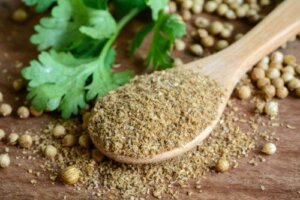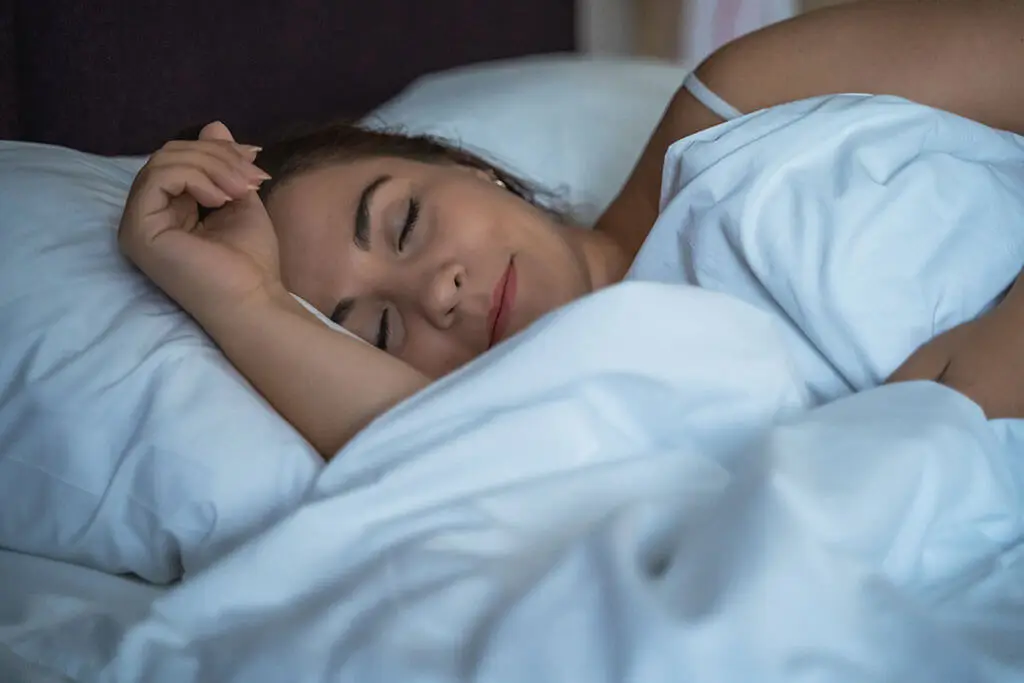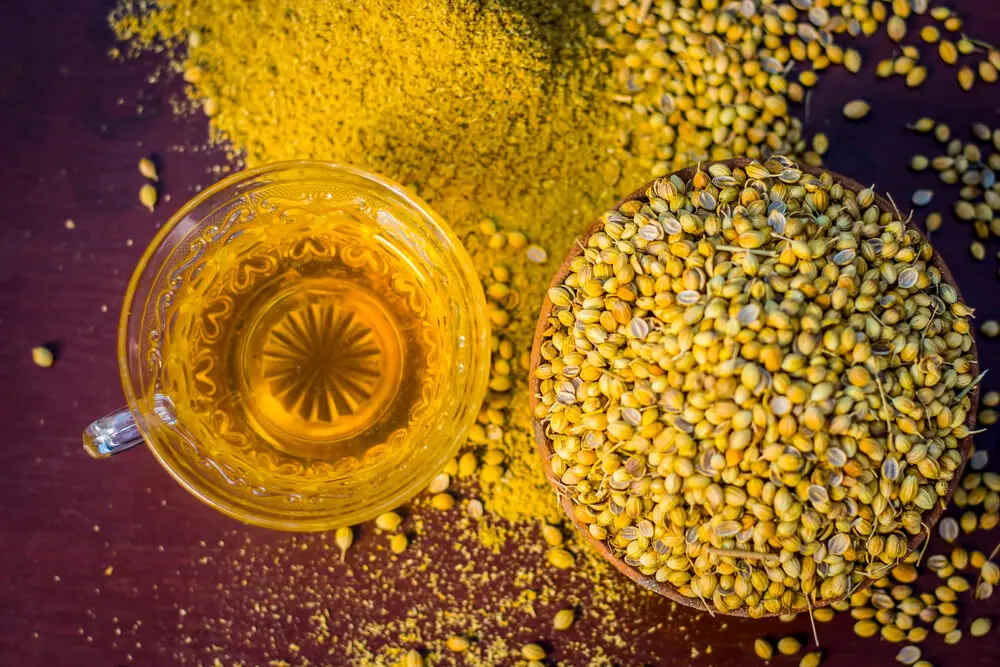Does Coriander Water Help You Sleep Better?


Reviewed and approved by the pharmacist Franciele Rohor de Souza
In folk medicine, coriander water has been one of the most widely used remedies among those seeking better sleep. According to anecdotal data, consuming this drink produces a relaxing effect that, in turn, induces restful sleep. But is there any evidence this works? Is it safe to consume it? Today, we’ll answer these questions.
First of all, it’s worth mentioning that this plant has beneficial components for health. As stated in a review shared in Food Research International, its bioactive phytochemicals provide antioxidant, anti-inflammatory, analgesic, neuroprotective, antimicrobial, and anxiolytic effects.
That said, it’s not surprising that coriander is used in the preparation of a wide variety of remedies. In fact, by simply including it regularly in your diet, it can contribute to well-being. In any case, today, we’ll take a look at whether it can work to promote sleep. Are you interested in learning more? Read on!
Coriander water: Can it help you sleep better?
Coriander, scientific name Coriandrum sativum, is a plant known for its applications in cooking and natural medicine. It belongs to the Apiaceae family and is native to the Middle East and the Mediterranean. Even so, its cultivation has spread throughout the world, so it’s also used in Europe, Africa, and America.
An article published in the journal Molecules details that this species is a source of phytochemicals such as polyphenols, vitamins, and phytosterols. This explains many of the benefits attributed to it.
And while the whole plant is beneficial, its seeds stand out for having a higher concentration of nutrients. In particular, they have an active substance called linalool, which is linked to the ability to modulate the pathogenic pathways of several diseases. But does it work to reduce sleep problems?
In this regard, it’s important to clarify a few things. There’s no scientific evidence that coriander water helps us to sleep better. Many of the effects attributed to its consumption come from anecdotal data.
And although some call it the “magic formula” for sleep, the truth is that it’s not been proven. For now, only some animal studies suggest that coriander has sedative effects and could prolong sleep. Let’s take a look at what the science says in detail.

We think you may also enjoy reading this article: How to Do Breathing Exercises to Improve Sleep
Research on coriander and its possible effects on sleep quality
One of the reasons why coriander water is believed to help you sleep better is because of its ability to reduce anxiety. In this regard, a study shared in the Journal of Ethnopharmacology determined that the aqueous extract of Coriandrum sativum seeds has anxiolytic and sedative effects.
Researchers even observed that it also has potential as a muscle relaxant, which undoubtedly favors rest. Meanwhile, Natural Product Research reported that coriander has a sleep-prolonging effect without a major neurotoxic effect.
In a more recent review, shared in the Avicenna Journal of Phytomedicine, it was noted that coriander seeds and leaves have antioxidant, sedative-hypnotic, diuretic, and anxiolytic activity.
It was also reported that its main active compound, linalool, has neuropharmacological effects that include anxiolytic, anticonvulsant, sedative, and anti-Alzheimer’s disease potential.
Although these findings are considered promising, they’re still insufficient to prove that coriander water helps you sleep better. This is first of all because they’ve only done in animal models or in the laboratory, and also because extracts have been used and not the beverage prepared in an artisanal way.
Is it safe to consume coriander water?
For most healthy adults, the consumption of coriander water is not a problem. However, it should be a moderate intake, since it can cause stomach discomfort, diarrhea, and photosensitivity when consumed in excess.
However, it shouldn’t be ignored that this drink also has a diuretic effect. Therefore, consuming too much of it before going to sleep can cause the opposite effect. This is because it increases the need to urinate throughout the night, which interrupts rest.
To counteract the above, the best option is to take maximum doses of 200 ml of the drink at least one hour before going to bed.
Due to the lack of studies on its effects and possible interactions, it’s not recommended to consume coriander water in the following cases:
- Diabetes
- Pregnancy and lactation
- Renal or hepatic insufficiency
- History of coriander allergy
- People about to undergo surgery
- People undergoing treatment with anticoagulants, antidiabetics, and antidepressants
In all these cases, it’s best to consult a doctor before consuming coriander water or any other supplement derived from the plant.
We think you may be interested in reading this, too: Improve Your Sleep Quality with these Healthy Bedtime Habits
How to prepare coriander water
You can proper coriander water in two different ways. The first is with the seeds and the second with the leaves.
Either works, but some say this drink is more effective with the seeds. Try it at home!

Ingredients
- 1 tablespoon of coriander seeds or leaves (7 g)
- 1 glass of water (200 ml)
Preparation and consumption
- First, heat the water until it comes to a boil.
- When it boils, remove it from the heat and add the coriander seeds or leaves.
- Then, cover the drink and let it stand until it is lukewarm.
- Drink it one hour before going to bed.
Avoid consuming this drink before any activities that require alertness. Remember that it causes drowsiness.
Does coriander water help you sleep?
There’s no evidence that coriander water helps you sleep. However, some studies suggest that the plant does have compounds that promote rest, relaxation, and anxiety relief.
In any case, this drink is safe for most people, so there’s no problem in trying it. The only thing to keep in mind is that it’s not good to take it in excess before bedtime, as it can have the opposite effect by increasing nighttime urination.
All cited sources were thoroughly reviewed by our team to ensure their quality, reliability, currency, and validity. The bibliography of this article was considered reliable and of academic or scientific accuracy.
- Prachayasittikul V, Prachayasittikul S, Ruchirawat S, Prachayasittikul V. Coriander (Coriandrum sativum): A promising functional food toward the well-being. Food Res Int. 2018 Mar;105:305-323. doi: 10.1016/j.foodres.2017.11.019. Epub 2017 Nov 21. PMID: 29433220.
- Mahleyuddin, Nisa Najibah et al. “Coriandrum sativum L.: A Review on Ethnopharmacology, Phytochemistry, and Cardiovascular Benefits.” Molecules (Basel, Switzerland) vol. 27,1 209. 30 Dec. 2021, doi:10.3390/molecules27010209
- Mahendra P, Bisht S. Anti-anxiety activity of Coriandrum sativum assessed using different experimental anxiety models. Indian J Pharmacol. 2011 Sep;43(5):574-7. doi: 10.4103/0253-7613.84975. PMID: 22022003; PMCID: PMC3195130.
- Emamghoreishi M, Khasaki M, Aazam MF. Coriandrum sativum: evaluation of its anxiolytic effect in the elevated plus-maze. J Ethnopharmacol. 2005 Jan 15;96(3):365-70. doi: 10.1016/j.jep.2004.06.022. PMID: 15619553.
- Rakhshandeh H, Sadeghnia HR, Ghorbani A. Sleep-prolonging effect of Coriandrum sativum hydro-alcoholic extract in mice. Nat Prod Res. 2012;26(22):2095-8. doi: 10.1080/14786419.2011.613388. Epub 2011 Oct 12. PMID: 21988208.
- Hosseini M, Boskabady MH, Khazdair MR. Neuroprotective effects of Coriandrum sativum and its constituent, linalool: A review. Avicenna J Phytomed. 2021 Sep-Oct;11(5):436-450. doi: 10.22038/AJP.2021.55681.2786. PMID: 34745916; PMCID: PMC8554282.
This text is provided for informational purposes only and does not replace consultation with a professional. If in doubt, consult your specialist.








